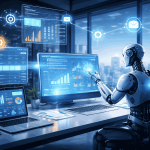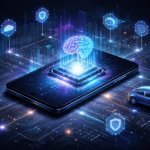
Essential IT Skills to Master in 2025
The IT industry is still growing at a startling rate. Recent assessments predict that by 2025F, the global IT market would have grown to a value of over $5 trillion. This increase demonstrates the rising need for qualified workers. Given how quickly technology is developing, it is now essential for IT professionals to pursue ongoing education.
But there are difficulties since the sector moves quickly. It might be intimidating to keep up with the newest trends. Skill gaps brought on by a failure to adapt could make it more difficult to remain relevant in the field.
The main competencies that every IT worker should concentrate on this year will be examined in this post. People can improve their employment chances and future-proof their expertise by becoming experts in these fields.
Cloud Computing: Mastering the Modern Infrastructure
Cloud Platforms (AWS, Azure, GCP)
The way businesses function has been revolutionized by cloud computing. The market is dominated by big platforms like Google Cloud Platform (GCP), Microsoft Azure, and Amazon Web Services (AWS). By 2023, AWS will have about 32% of the market, with Azure coming in second at 20%. Your career objectives will determine which platform is best for you to specialize in. Find out which platform is most in demand by looking through local job posts.
Serverless Computing and Microservices
Developers can create and execute apps using serverless computing without having to worry about maintaining servers. Businesses like Spotify and Netflix use this system to scale their services efficiently. Applications are divided into smaller, easier-to-manage components via microservices. This method improves efficiency and streamlines development.
Cloud Security Best Practices
Security is still a major problem with the growth of cloud computing. Data breaches are becoming more frequent and costing companies billions of dollars. The average cost of a data breach in 2023 was $4.35 million, per a recent report. IT workers who want to reduce risks and safeguard sensitive data must become proficient in cloud security.
Cybersecurity: Protecting Against Evolving Threats
Ethical Hacking and Penetration Testing
Ethical hackers are in greater demand than ever before. To identify weaknesses before malevolent actors do, these experts mimic attacks. Credibility in this field can be increased by certifications such as the Certified Ethical Hacker (CEH), which increases a candidate’s appeal to employers.
Incident Response and Forensics
In the current digital era, incident response is essential. When a security incident happens, IT professionals have to respond quickly. Examples from the real world, like as the 2017 Equifax hack, highlight how crucial it is to have a strong incident response plan. Forensic investigations aid in understanding the ways in which breaches transpired after such incidents.
AI-Powered Security Tools
Cybersecurity is changing due to artificial intelligence. Artificial intelligence (AI) algorithms are far quicker than humans at analyzing patterns and spotting anomalies. Machine learning is used by solutions like Darktrace and CrowdStrike to detect threats in real time, which makes them essential for data protection.
Data Science and Analytics: Extracting Value from Data
Big Data Technologies (Hadoop, Spark)
The volume of data produced is astounding. Global data is expected to exceed 175 zettabytes by 2025. Big data tools like Spark and Hadoop are essential for organizing and analyzing this data. Gaining knowledge of these frameworks can lead to fascinating job prospects.
Data Visualization and Storytelling
Data analysis is crucial, but so is effectively communicating insights. Professionals may produce captivating visual narratives with the aid of programs like Tableau or Power BI. Organizational decision-making processes can be greatly impacted by this capacity to convey findings.
Machine Learning and AI Fundamentals
Comprehending the fundamentals of machine learning is essential for future IT jobs. Applications ranging from chatbots for customer service to predictive analytics are built on ideas like supervised and unsupervised learning.
DevOps and Automation: Streamlining Development Processes
Infrastructure as Code (IaC)
Instead than using manual methods, IaC enables IT teams to control infrastructure through code. This method lowers errors while increasing efficiency. IaC implementation is often done with tools like Terraform and Ansible.
Continuous Integration/Continuous Deployment (CI/CD)
In software development, automation improves quality and speed. Regular integration of code changes by developers through CI/CD methods facilitates the deployment of updates. Gaining proficiency in these techniques can greatly improve workflow efficiency.
Containerization and Orchestration (Docker, Kubernetes)
Applications can operate in separate environments thanks to containerization. Containers may be effectively created, deployed, and managed with the help of tools like Docker. In contrast, Kubernetes orchestrates these containers, guaranteeing seamless functioning in intricate systems.
Emerging Technologies: Staying Ahead of the Curve
Artificial Intelligence (AI) and Machine Learning (ML)
Healthcare, banking, and customer service are just a few of the IT domains where AI and ML have broad ramifications. The growth of businesses investing in AI technologies indicates the demand for qualified experts in this area.
Blockchain Technology
Blockchain is more than just cryptocurrency’s foundation. Its decentralized and transparent tenets can be applied to a wide range of fields, including voting systems and supply chain management. IT workers can gain a competitive advantage by comprehending blockchain technology.
Extended Reality (XR) – VR/AR/MR
Virtual reality (VR), augmented reality (AR), and mixed reality (MR) are all included in extended reality. These technologies are quickly becoming popular in training, education, and gaming. XR skills can open up intriguing prospects across a range of businesses.
Investing in Your Future
Gaining proficiency in these crucial IT abilities will have you ready for 2025 and beyond. Keeping up with the latest developments in cloud computing, cybersecurity, data science, DevOps, and emerging technologies is essential for professional advancement.
Take control of your education. To further your proficiency in these fields, look into pertinent certifications and online courses. Make an investment now for your future. For those willing to learn and adjust, the options are virtually limitless.
Author Profile

- Online Media & PR Strategist
- Hello there! I'm Online Media & PR Strategist at NeticSpace | Passionate Journalist, Blogger, and SEO Specialist
Latest entries
 AI WorkflowsJanuary 30, 2026Agentic AI Workflows for Automating Business Tasks
AI WorkflowsJanuary 30, 2026Agentic AI Workflows for Automating Business Tasks Cloud ComputingJanuary 27, 2026Multi-Hybrid Strategy for Cloud Resilience and Vendor Freedom
Cloud ComputingJanuary 27, 2026Multi-Hybrid Strategy for Cloud Resilience and Vendor Freedom AI WorkflowsJanuary 26, 2026On Device AI Processing for Faster, Private Mobile Interfaces
AI WorkflowsJanuary 26, 2026On Device AI Processing for Faster, Private Mobile Interfaces AI WorkflowsJanuary 23, 2026AI Driven Threats: Deepfakes, Ransomware, and New Rules
AI WorkflowsJanuary 23, 2026AI Driven Threats: Deepfakes, Ransomware, and New Rules

